Overview
Order management solutions (OMS) are a game-changer for equipment manufacturers! They not only streamline order processing but also enhance inventory management and boost customer satisfaction. Imagine having features like real-time tracking and automated request handling at your fingertips.
But let’s be real—manufacturers face some tough challenges. Think about complex product configurations and the ever-present need for regulatory compliance. It’s no walk in the park! This article dives into these challenges and compares leading OMS platforms. The takeaway? Tailored solutions are a must! They need to integrate seamlessly with your existing systems to really amp up operational efficiency.
So, are you ready to explore how the right OMS can transform your business? Let’s dive in!
Introduction
Order management solutions are vital tools that help equipment manufacturers streamline their operations and boost customer satisfaction. Imagine automating processes and gaining real-time insights into inventory and order status—sounds great, right? These systems can really cut down on errors and ramp up efficiency. But with so many options out there, how do manufacturers find the best fit for their unique challenges?
Let’s explore the key features, benefits, and integration capabilities of leading order management systems. By doing so, we uncover not just the opportunities for operational excellence but also the important considerations that need to be addressed for a successful implementation. What do you think could be the game-changer for your operations?
Understanding Order Management Systems: Key Features and Benefits
Order management solutions are pretty much the superheroes of order processing! They’re order management solutions that are designed to streamline and automate the entire lifecycle of requests. Let’s dive into some of their key features that make life easier:
- Centralized Order Management: Imagine managing orders from all your channels in one spot! This not only cuts down on errors but also boosts efficiency.
- Real-Time Inventory Tracking: No more guessing games! With this feature, you can keep an eye on stock levels, helping you avoid those pesky stockouts and overstock situations.
- Automated Processing of Requests: Say goodbye to manual entry mistakes! This automation speeds up the fulfillment process, making everything run smoother.
- Client Communication Tools: Keep your customers in the loop! These tools enhance the client experience by providing updates on purchase status and tracking.
So, why should you consider adopting order management solutions (OMS)? Well, the benefits are pretty compelling! You’ll see improved accuracy in requests, quicker processing times, happier customers, and better inventory management. All of these elements are crucial for equipment producers aiming to thrive in a competitive landscape.
Isn’t it time to explore how an OMS can transform your order management process?
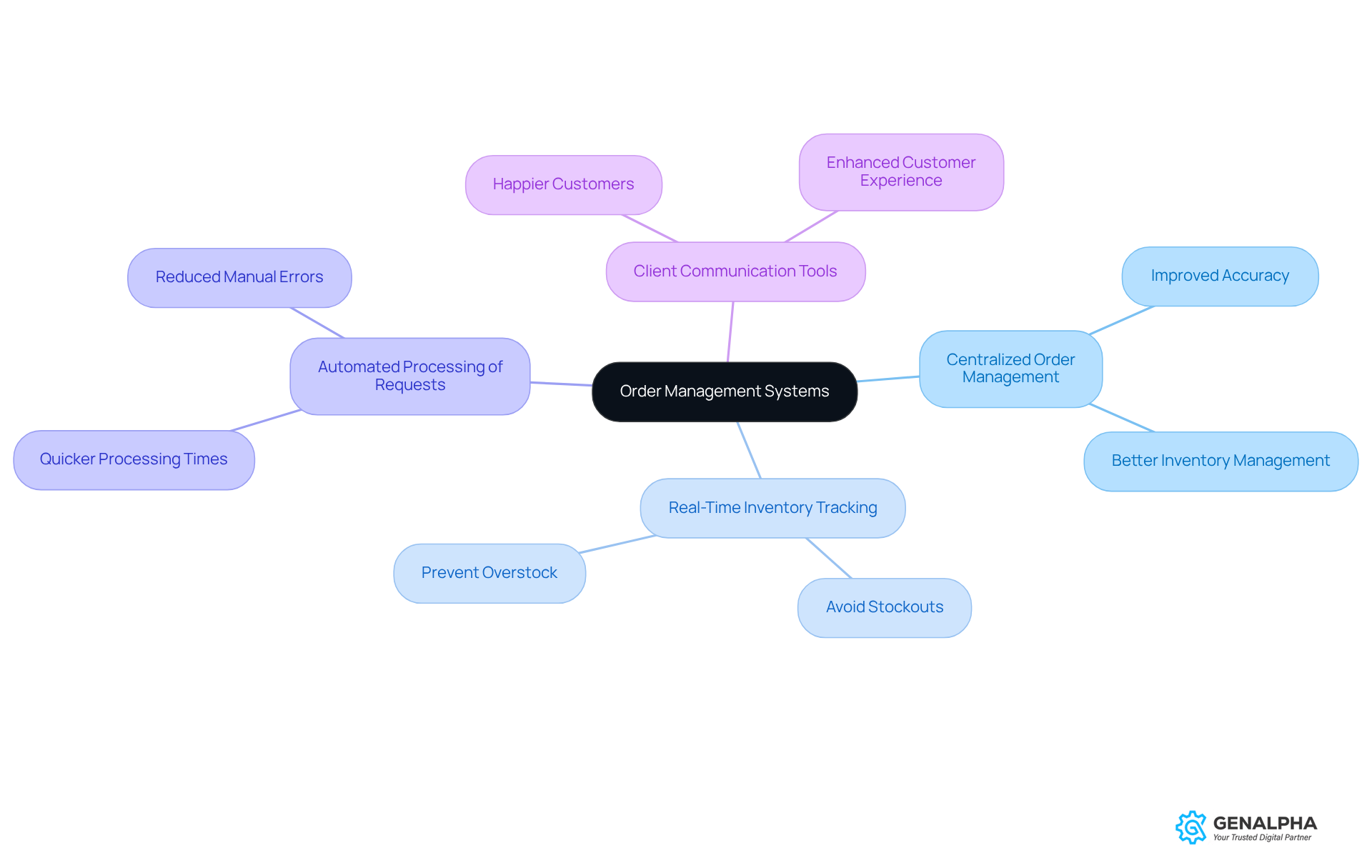
Identifying the Unique Needs of Equipment Manufacturers in Order Management
Equipment producers encounter unique challenges that call for specialized management solutions (OMS). Let’s dive into some of these hurdles together:
-
Complex Product Configurations: Think about it—many equipment orders are highly customizable. This means we need order management solutions that can handle a variety of configurations and specifications with ease. The complexity is real, especially since industrial machines often require extensive customization. Accurate quoting becomes crucial to minimize errors and boost customer satisfaction. For instance, CPQ solutions like Tacton CPQ can generate precise quotes for these tailored products, significantly reducing mistakes and speeding up the sales cycle.
-
High Volume of Requests: Manufacturers often juggle a hefty volume of requests, which means we need systems that can efficiently process and track multiple inquiries at once. Imagine being able to whip up accurate quotes quickly—this can really ramp up quoting volumes, leading to more orders and improved sales performance. Statistics show that with CPQ software, sales reps can create accurate quotes in just minutes after a customer inquiry, making the whole process much more efficient. An effective order management solutions system should seamlessly connect with supply chain management networks. Why? To ensure timely delivery and maintain inventory accuracy, of course! This integration is key to balancing resilience with efficiency in supply chain operations—something that’s becoming increasingly important for producers. For example, Tacton CPQ works well with existing ERP systems, giving sales teams access to real-time customer and product information.
-
Regulatory Compliance: Let’s not forget about regulatory compliance. It’s essential for producers to stay on top of industry regulations, which is why order management solutions need to support compliance tracking and reporting. This capability helps reduce risks related to regulatory requirements, allowing producers to operate smoothly within legal frameworks. By implementing specialized order management solutions, compliance processes can be streamlined, thereby easing the burden on producers.
By tackling these unique needs, producers can significantly boost their operational efficiency and customer satisfaction, setting themselves up for success in a competitive marketplace. So, how are you addressing these challenges in your operations?
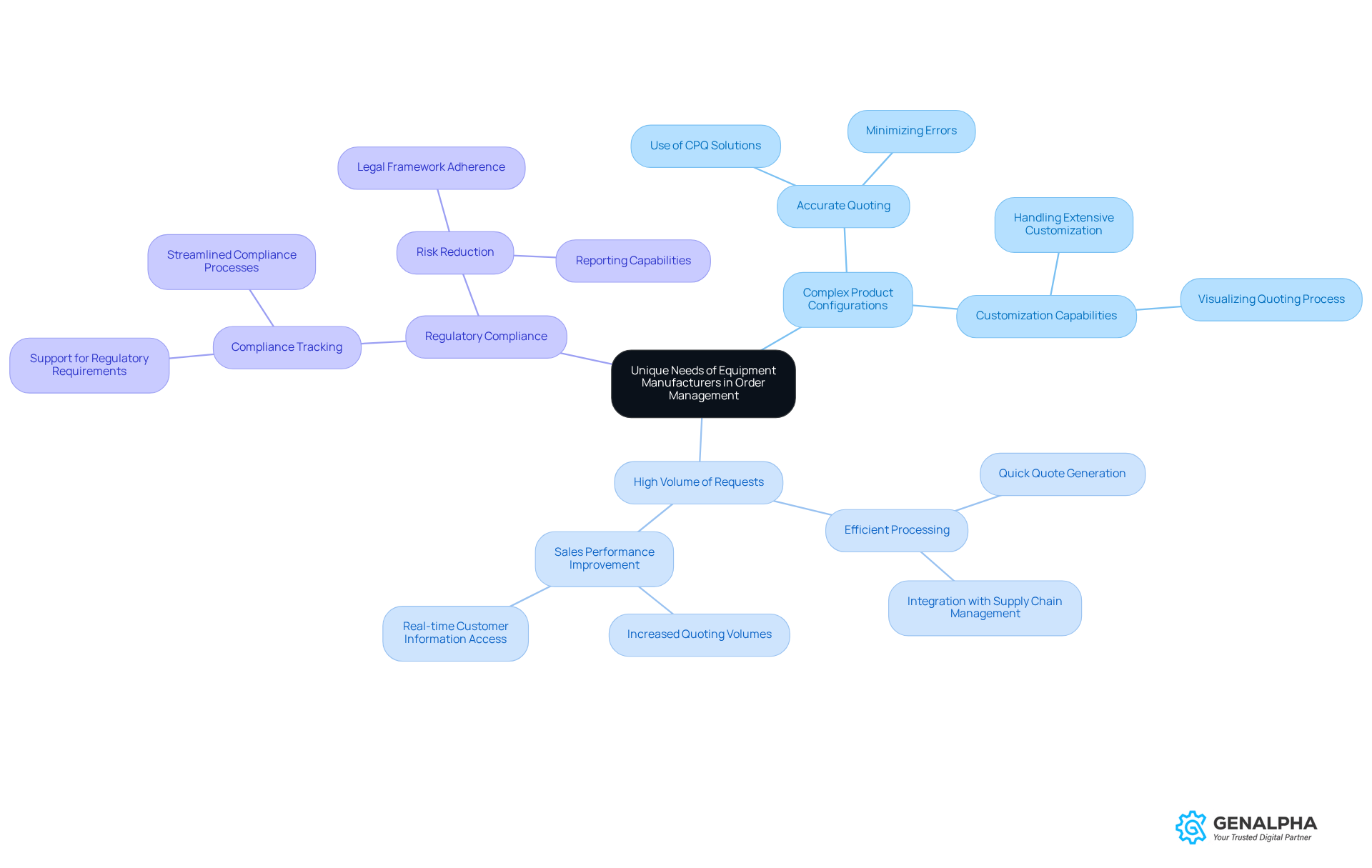
Comparative Analysis of Leading Order Management Solutions for Equipment Manufacturers
In the competitive world of order management solutions for equipment manufacturers, a select few platforms truly stand out, each tailored to address various operational needs. Let's take a closer look at some of the top contenders:
-
NetSuite: Known for its seamless ERP integration, NetSuite offers extensive management capabilities like real-time inventory tracking and automated workflows. This is particularly beneficial for larger producers with complex operational demands. With its robust features, it helps improve performance and reduce operating costs, which is crucial as the market is projected to hit USD 3.17 Billion by 2030, growing at a CAGR of 5.48% from 2024 to 2030.
-
Zoho Inventory: If you're a small to medium-sized producer, Zoho Inventory might be your best bet. It's a budget-friendly option that provides essential order management solutions and easy integration with various platforms. This makes it a great choice for businesses looking to boost their efficiency. Plus, it’s especially helpful for producers wanting to optimize their operations and enhance customer satisfaction with order management solutions.
-
Fishbowl: For those using QuickBooks, Fishbowl really shines in inventory management. Its robust features make inventory control and order processing a breeze, ensuring everything runs smoothly. What’s more, it offers a unique customer experience that sets it apart from other platforms, enhancing customer engagement and satisfaction.
-
SAP Commerce Cloud: Tailored for large enterprises, this platform provides advanced functionalities like extensive customization and powerful analytics. It’s perfect for producers dealing with multiple product lines and wanting in-depth insights into their operations. Its integration with eCommerce platforms further boosts its capabilities, allowing for seamless operations.
-
Orderhive: Known for its user-friendly interface, Orderhive excels in multi-channel selling, making it a fantastic option for producers looking to enhance processing across various sales platforms. However, businesses in omnichannel settings might face challenges like stock discrepancies and cancellations. Thankfully, Orderhive can help alleviate these issues with its efficient management processes.
Each of these order management solutions has its own set of advantages and potential drawbacks, which is why it’s essential for manufacturers to evaluate their specific needs and operational intricacies before making a choice. As Russ Davidson points out, comparing pricing, features, and benefits is key to making an informed decision. So, which solution do you think fits your needs best?
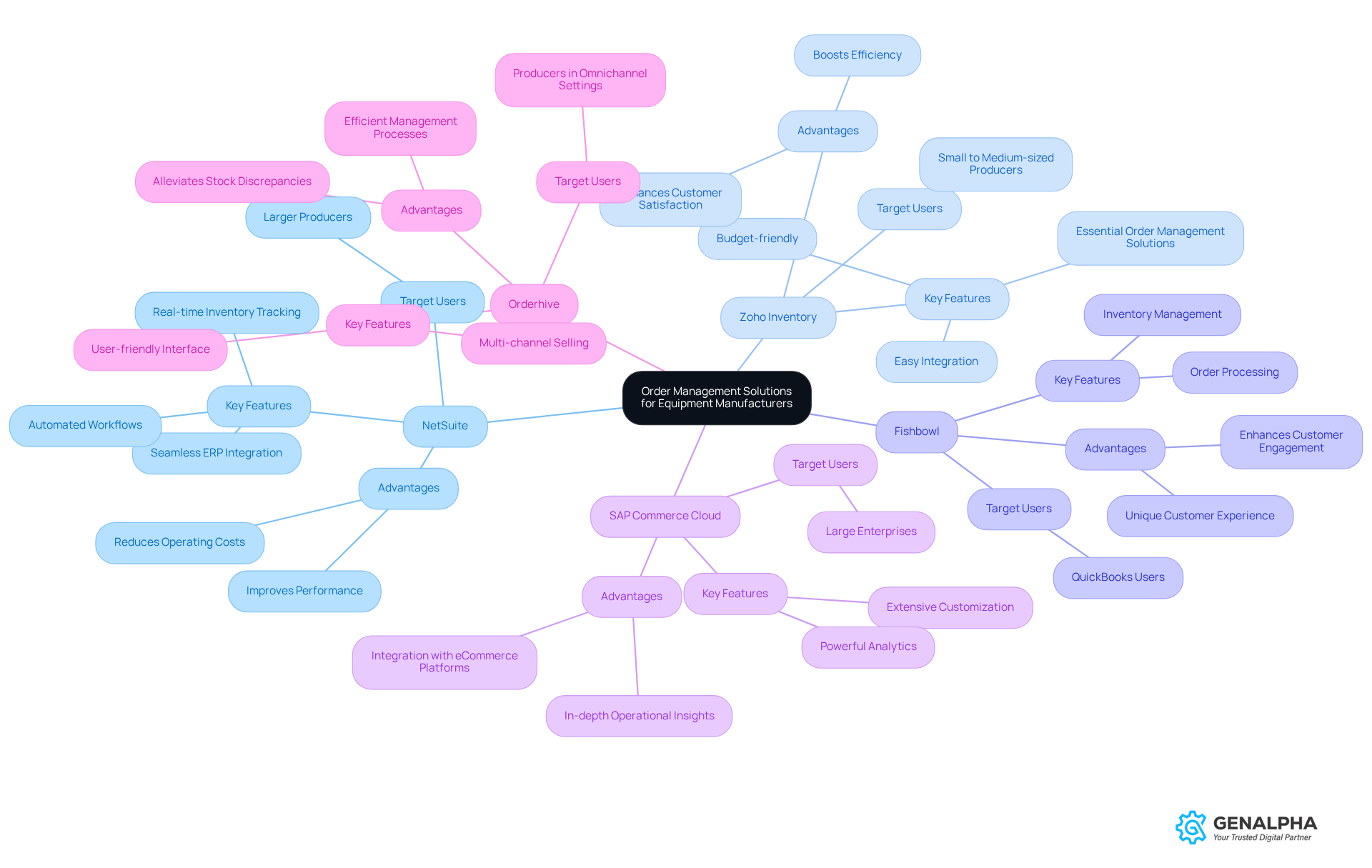
Evaluating Integration Capabilities with Existing Systems
When you're on the hunt for order management solutions, it's super important to think about how well they can integrate with your existing platforms. Why? Because this can really boost your operational efficiency and keep your customers happy. Here are some key things to consider:
-
ERP Integration: Your OMS should work seamlessly with ERP systems. This ensures that your inventory management and financial reporting are spot on. In fact, manufacturers using ERP solutions have reported a 49.2% boost in process efficiency thanks to real-time data visibility. Pretty impressive, right?
-
CRM Compatibility: Think about how integrating with client relationship management (CRM) platforms can take your service to the next level. Sales teams will have real-time order info at their fingertips! Research shows that organizations combining ERP and CRM solutions see better lead times and improved decision-making. This all leads to happier customers and greater loyalty. Just check out the case study titled "Key Benefits of ERP-CRM Integration in Manufacturing" for a closer look at how manufacturers streamline processes and enhance operational efficiencies through this integration.
-
Supply Chain Management: Your OMS needs to connect with supply chain networks to ensure timely order fulfillment and inventory replenishment. When supply chains are integrated effectively, you can cut down on operational costs and be more responsive to market demands—essential in today’s fast-paced world.
-
API Availability: A solid API is a game changer for custom integrations with other software, giving you the flexibility to adapt as your business grows. This is becoming increasingly important, especially since it's predicted that 50% of existing work tasks will shift to automation by 2030. We need systems that can evolve alongside technological advancements. As Lisa Schwarz puts it, "An enterprise resource planning (ERP) system is the key to integrating different business functions across an organization."
Manufacturers should really focus on solutions that excel in integration capabilities. Did you know that 93% of organizations consider their ERP implementation a success when it includes effective integration strategies? By prioritizing this, you can maximize your investment in order management solutions and enhance your overall operational performance. So, what are you waiting for? Let’s make those integrations work for you!
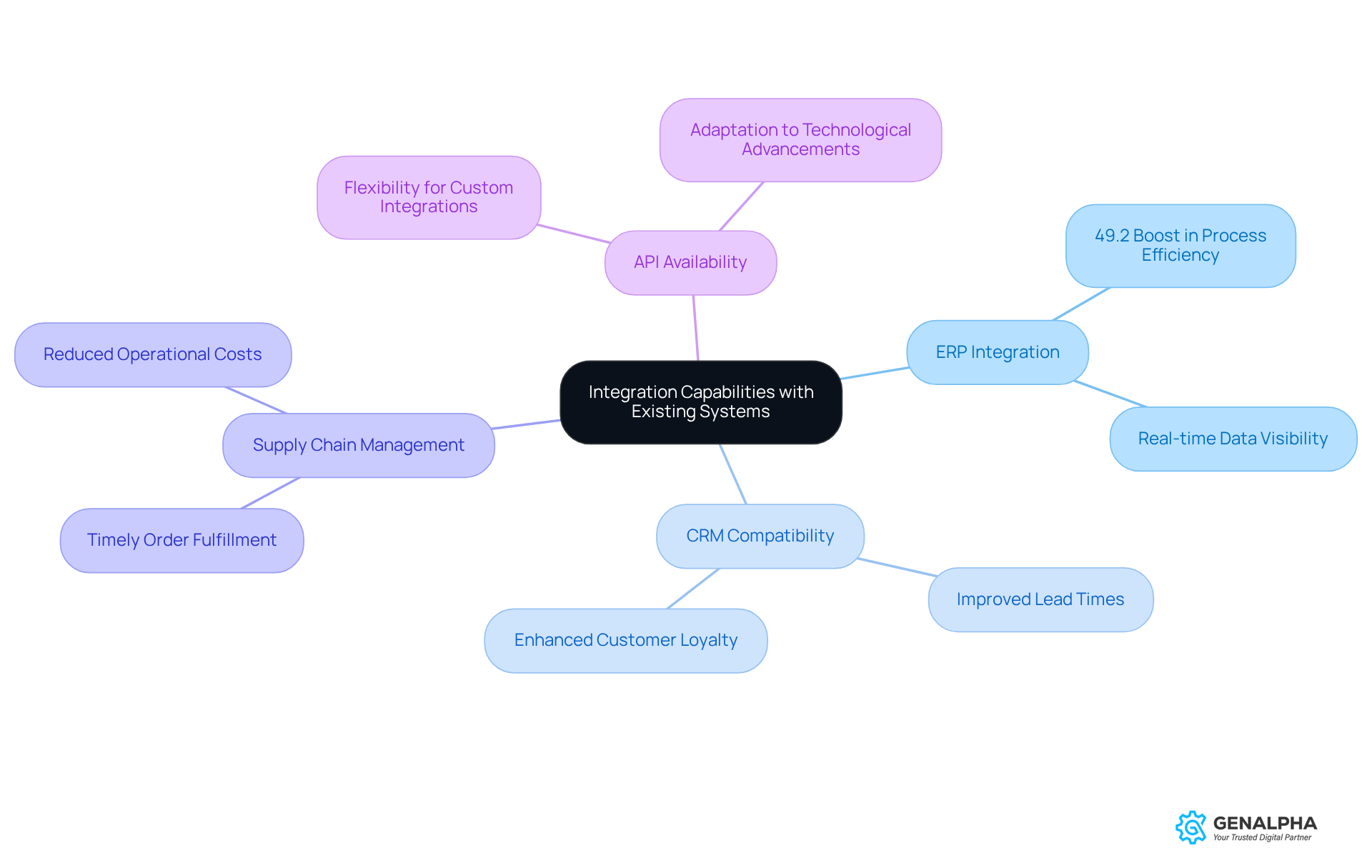
Recommendations for Choosing the Right Order Management Solution
Choosing the right order management solutions can feel a bit overwhelming, but it doesn't have to be! Let’s break it down into some simple steps that can help you find the perfect fit for your business.
- Assess Your Needs: First things first, what do you really need? Think about your business size, how many transactions you handle, and the complexity of your products. This is your starting point!
- Evaluate Features: Next up, look for essential features. You’ll want things like real-time inventory tracking, automated transaction processing, and tools for customer communication. These are game-changers!
- Consider Scalability: Can the solution grow with you? Make sure it can handle increased order volumes and new sales channels as your business expands.
- Check Integration Options: It’s crucial that your order management system (OMS) can play nice with your existing ERP, CRM, and supply chain systems. Integration can save you a lot of headaches down the line.
- Review Vendor Support: Don’t forget to check out the vendor’s support! A strong client assistance and training resources can make all the difference during implementation.
- Read User Reviews: Finally, take a peek at what other users are saying. Their experiences can give you valuable insights into the effectiveness and reliability of the OMS.
By following these recommendations, you can select order management solutions that not only enhance your operational efficiency but also boost customer satisfaction. So, are you ready to take the next step in streamlining your order management?
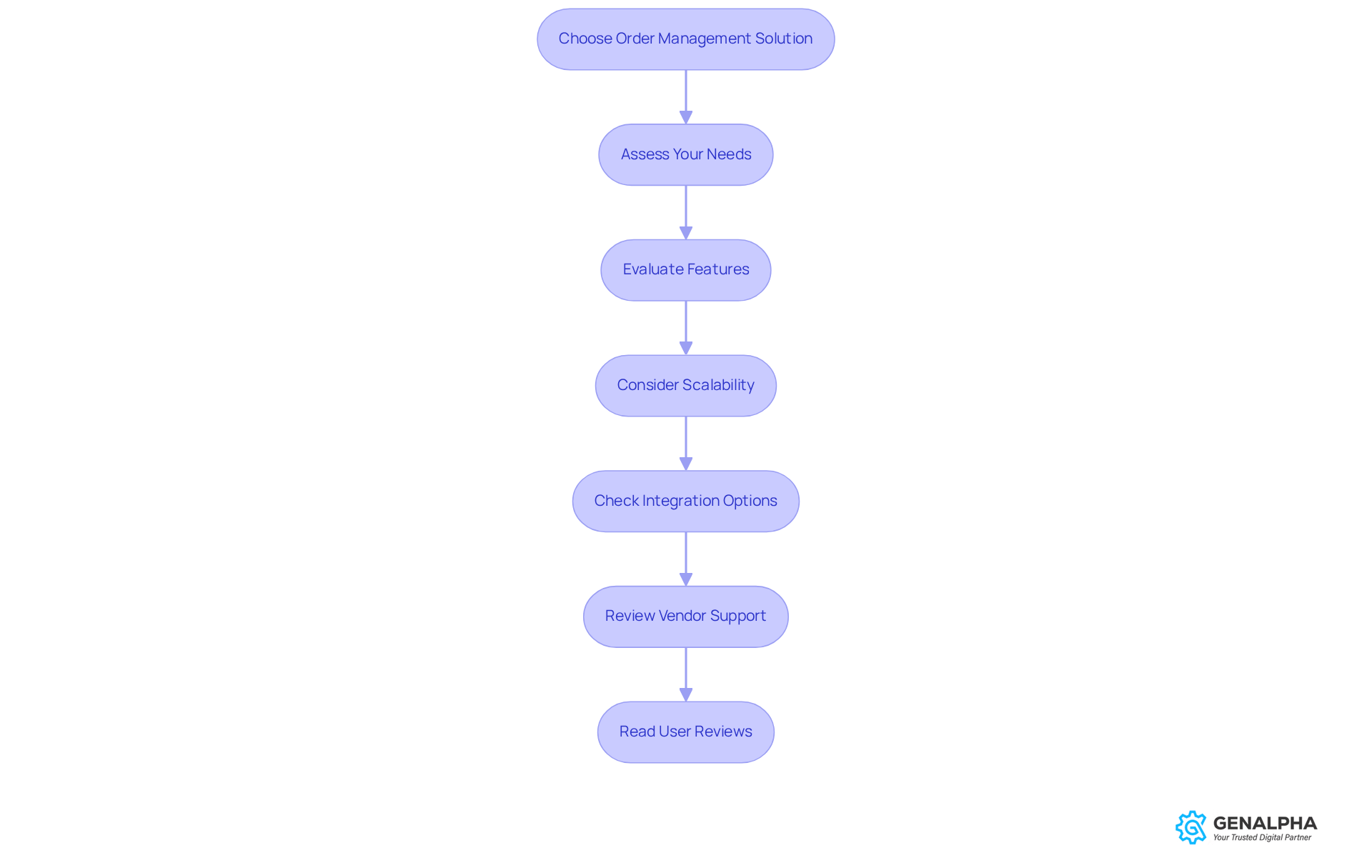
Conclusion
Order management solutions are truly game-changers for equipment manufacturers. They help boost operational efficiency by automating and streamlining the order processing lifecycle. Think about it: these systems tackle the unique challenges producers face, like complex product configurations and a flood of requests. By embracing an effective OMS, you can expect improved accuracy, quicker processing times, and, ultimately, happier customers.
Throughout this article, we’ve highlighted some key features of order management solutions. Centralized management, real-time inventory tracking, and automated processing are just a few benefits that stand out. When we compared leading platforms like NetSuite, Zoho Inventory, and Fishbowl, it became clear how different solutions can cater to various operational needs. Plus, we emphasized how crucial it is to integrate these systems with your existing tools, like ERP and CRM, to truly maximize the benefits of an OMS.
So, as we wrap up, remember that choosing the right order management solution isn’t just about picking software; it’s a strategic move that can shape the future of your business. By taking the time to assess your needs, evaluate features, and ensure compatibility with your current systems, you can enhance your operational capabilities and stay competitive in the marketplace. Why wait? Taking action now to implement a tailored OMS can pave the way for streamlined processes and a more responsive business model, positioning you for growth in this rapidly evolving industry.
Frequently Asked Questions
What is an Order Management System (OMS)?
An Order Management System (OMS) is a solution designed to streamline and automate the entire lifecycle of order processing, helping manage orders from multiple channels in one centralized location.
What are the key features of an Order Management System?
Key features of an OMS include centralized order management, real-time inventory tracking, automated processing of requests, and client communication tools.
How does centralized order management benefit businesses?
Centralized order management reduces errors and boosts efficiency by allowing businesses to manage orders from all channels in one spot.
What is the advantage of real-time inventory tracking?
Real-time inventory tracking helps businesses avoid stockouts and overstock situations by keeping an accurate eye on stock levels.
How does automated processing of requests improve order management?
Automated processing speeds up the fulfillment process and minimizes manual entry mistakes, leading to smoother operations.
What role do client communication tools play in an OMS?
Client communication tools enhance the customer experience by providing updates on purchase status and tracking information.
What benefits can equipment manufacturers expect from adopting an OMS?
Equipment manufacturers can expect improved accuracy in requests, quicker processing times, enhanced customer satisfaction, and better inventory management.
What unique challenges do equipment manufacturers face in order management?
Equipment manufacturers face challenges such as complex product configurations, high volumes of requests, and the need for regulatory compliance.
How can an OMS handle complex product configurations?
An OMS can manage various configurations and specifications effectively, which is essential for highly customizable equipment orders, improving accuracy and customer satisfaction.
Why is it important for manufacturers to manage high volumes of requests?
Efficiently managing high volumes of requests allows manufacturers to quickly generate accurate quotes, leading to increased order volumes and improved sales performance.
How does regulatory compliance factor into order management for equipment manufacturers?
Order management solutions support compliance tracking and reporting, helping manufacturers stay on top of industry regulations and reduce risks associated with regulatory requirements.
How can specialized order management solutions improve operational efficiency?
By addressing the unique needs of equipment producers, specialized order management solutions can streamline processes, enhance customer satisfaction, and improve overall operational efficiency.




